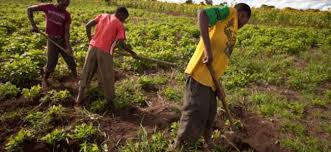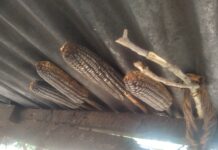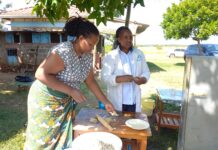By James Adika
A new campaign to revive cotton farming and marketing in Homa Bay County has begun.
The county government has rolled out a cotton revival campaign and has already helped farmers to sell 96,000 tonnes of the product since last year.
Trade executive Peter Ogada said 2,000 acres of land will be used to grow cotton this year. He said Sh600, 000 revolving fund the county gave to farmers last year helped them take up cotton farming.
Ogada spoke at the Tom Mboya University College where he and Deputy Governor Hamilton Orata addressed more than 100 cotton farmers.
Ogada said the county government is working with the Directorate of Cotton Development to market cotton produced in the county.
“We want to announce that the cotton sub-sector has been revived and hundreds of farmers who had abandoned the crop are back,” He said.
Cotton farming was once a major economic activity in South Nyanza region.
The two ginneries that were managed by the Cotton Board of Kenya were run down and later sold to an individual, who also failed to manage them.
Orata said the collapse of cotton growing in the 1980s had affected several families and its revival will give them a new lease of life.
“Plans to establish a processing factory are in top gear. We want to add value to cotton to enable farmers maximize the profit from their produce. But the factory will require a harvest from 46 acres everyday throughout the year for it to run,” He said.
Orata added a national committee had been established to deal with issues of value addition, inputs and markets.
The CDD official in charge of production, Charles Adhola, said four acres will be set aside in each of the 40 wards as model demonstration farms to help in extension services.
Other than tending to her crop, Mrs. Beatrice Obara supervises the collection of cotton from over 2,800 farmers contracted by her company in Homabay, Kisumu, Migori, Siaya and Busia counties.
Mrs Obara, also an hotelier, weighs and pays the farmers Sh42 for every kilogramme before transporting the produce for processing at Makueni ginnery.
“My agents have finished weighing the cotton and farmers are now waiting for me to send money to their co-operative society,” Mrs Obara said in an interview with Talk Africa.
The ginnery separates cotton seeds from the lint. The lint is exported while the seeds are taken back to western Kenya for planting. Mrs Obara’s company, Dedeby Green Ventures capital, treats and re-packages the seeds into seven kilogramme bags enough for an acre and sells them to farmers at Sh40.
“The seeds should be in the market by now so that immediately the rains start, we plant,” she said.
Mrs Obara’s passion for cotton growing is bringing back to life an industry that has been on its knees in Kenya for decades.
Cotton business in western Kenya has been battered since the closure of Kisumu Cotton Mills Limited (Kicomi) in the early 1990’s. Its collapse denied income to thousands of small-scale farmers.
But the passionate farmer has been going out of her way to find a market, not only for produce from her 10-acre farm in Uyoma, Siaya County, but also for other smallholder farmers.
“Since I was young, my parents used to enjoy good returns from cotton. And since black cotton soil is still our pride, I thought of outsourcing a market to encourage cotton farmers,” she said.
In 2009, Mrs Obara registered Dedeby Green Ventures capital limited and lobbied 300 farmers to start supplying her with cotton. She was assisted by Rural African Ventures Investments, a company which supports young entrepreneurs, to identify a buyer.
Having met global fibre quality standards, they started supplying Makueni ginnery with 30,000 kilos of cotton.
“The ginnery needed a lot, which we could not meet, but we had to start. We went out to motivate more farmers to venture into cotton,” she said.
To woo more farmers, Mrs. Obara partnered with a Swiss financing company, which provided capital enabling farmers to be paid on delivery.
“We called it cash-on-the-bags since it was paid immediately the bags of cotton were delivered. With this, more farmers saw the need to grow cotton,” she said.
Deliveries to Makueni ginnery from the region has since increased from the initial 30,000 kilos to 90,000 kilogrammes in 2013 and 270,000 kilos last year.
The company has employed three agents to collect and store cotton in the region. The agents, who run stores in Uyoma, Ndhiwa and Nyakach, check the harvests’ quality, weigh, and label it. At times, they transport to Makueni ginnery.
Cotton quality is established by colour and length of the fibre. High quality fibre is usually long and white.
Mr. Isack Alanyo, a cotton farmer in Kanyada, Homa Bay County has been making good business through Dedeby Green Ventures.
“We had been having problems with cotton market for a long time. After closure of Kicomi, Kibos ginnery was set up in Kisumu but it was a short-lived relief for farmers. We got word that its license was revoked,” he said.
“But Mrs. Obara came in handy to resuscitate the trade. I have increased the acreage under cotton from three to 10 acres,” he added.
The highest that previous buyers paid were Sh60 per kilo. But the Sh42 paid by Dedeby Green Ventures was fair since it factors high cost of transport, notes Mr. Alanyo. Mrs. Obara pays about Sh40, 000 to transport five tonnes of cotton to Makueni ginnery.
To improve their income, however, Mr. Alanyo says, the government should cut the cost of pesticides. “A common pesticide bulldog has shot from Sh250 per 50ml packet to Sh500. It means a small farmer spends Sh2, 000 to control pests in an acre of cotton. This is too high,” he said.
Mr. Wilson Haya, an agent and farmer from Siaya said growing cotton was profitable since the company trains on inter-cropping cotton with green grams, beans and maize.
“The company also helps farmers find market the other crops in supermarkets,” he said.
Cotton takes about five months to mature after which it requires manual labour for picking. The farmers are careful not to let them fall on the ground to avoid discoloration, which would see them rejected by the buyer.
“We are operating far from the market. For every three kilos of raw product, only a kilo of lint is retained while we bring back the other two as seeds. It makes little business sense,” Mrs Obara said.
“It’s either we get someone, who accepts the produce as a whole or identify a market in Nyanza for seeds, since Makueni ginnery buys lint only,” she said.
Mrs. Obara has formally requested Homa Bay County government to partner with farmers with a view to establish village ginneries. “If we had a ginnery in Nyanza, it would be cost effective. The lint and seeds would be separated before any transportation,” she said.
Dedeby Green Ventures hopes to establish a ginnery that would process cotton seeds into animal feed besides starting textile centres for locals to make hand-woven materials as it happens in India.
“We will also ask local seed companies to give farmers certified seeds so that we eliminate use of seeds from previous harvests,” she said.
Profitable cotton farming requires at least an acre for a farmer to record a profit. Mrs. Obara said the total cost of inputs (farm preparation, fertilizer, disease control and storage) goes up when the farm is below two acres.
“Storage costs the farmer an average of Sh26 per kilo, which is the break-even point. But when it’s less than an acre, cost goes up to Sh33,” she said.















